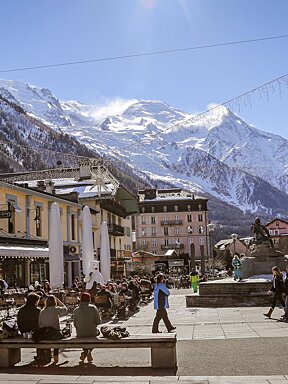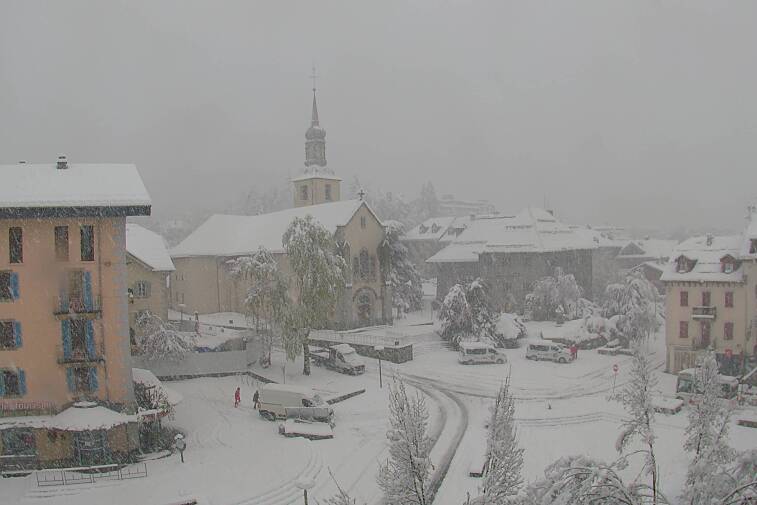



Movies playing in English at Chamonix Cinema Vox
The current film programme hasn't changed dramatically since our last round-up, which is great as there are some stellar films to choose from! Dates/times may have changed, so be sure to check the Cinema Vox website for details.
Black Swan, The King's Speech, Hereafter, and 127 Hours are playing in original language English with French subtitles (VOST) at Chamonix's Cinema Vox now through March 1st with evening show times
BLACK SWAN
(showing 16/02 17/02 18/02 19/02 24/02 25/02 26/02)
Dancer Nina (Natalie Portman) lives a sheltered, ballet-obsessed live with her over-protective, ex-ballerina mother (Barbara Hershey). When Nina is promoted to prima for a new production of Swan Lake, her director (Vincent Cassel) encourages her to explore her dark side so that she can epitomize the dual role of the Swan Queen and the Black Swan. This exploration, combined with her insecurities over the ambitions of a new arrival at the company, pushes Nina towards the snapping point.
Director Darren Aronofsky intends for Black Swan to be the companion piece to his 2008 film The Wrestler. Despite the difference in subject matter, both play out in run-down, backstage interiors; both display a fascination with specialist professions, and lavish attention on minute, arcane rituals; both have cringe-inducing moments as a result of the potentially crippling physical challenges of these professions; both subtly examine the tension between age and ambition; and both are shot using mostly handheld cameras in order to invade the personal space of the actors/characters.
Black Swan won't be to everyone's taste, but it is an impressive offering from one of America's most exciting directing talents. Moreover, this film showcases Aronofsky's ability to coax career-best turns out of his leads actors, in this case Portman, who gives a flawless performance.
THE KING'S SPEECH (Le Discours d'un Roi)
(showing 15/02 20/02 21/02 22/02 )
Prince George (Colin Firth) has been afflicted by a debilitating stammer since childhood. When his brother abdicates the throne, and war is looming, he hesitantly turns to Aussie Lionel Logue (Geoffrey Rush), who is a speech therapist with unconventional methods, in order to be able to soothe a frightened nation.
Despite its decent cast and nice costumes, this film was initially low on the radar for greatness. However, after a sneak-peak at a film festival in America, bloggers and Tweeters announced it to be an Oscar favourite and the world opened its eyes to it. But this is not a pretentious film - this is a crowd pleaser. The script transforms history into an approachable form, and it's dramatic, witty and enlightening. It focuses on the unlikely friendship between the outspoken Aussie and the reluctant-speaking aristocrat. This is a story less about fixing a voice than fixing a mind that has been bullied by his father since boyhood and has not had a childhood in the face of the responsibilities for the throne.
Even as Firth doesn't have many words to say, he doesn't stop communicating sadness, yearning, and pain; intelligence and humour demanding an escape; and the self-possession of a man born to privilege. Rush as Logue, is in equally fine form, a brash man with a huge heart. Helena Bonham Carter is a lively Queen Elizabeth, portraying both a teasing wit and a devoted wife. The script, the actors and the loving shots of London make this a film worth watching.
HEREAFTER (Au-delà)
(showing 15/2 20/02 21/02 27/02 01/03)
After a near-death experience during a tsunami, French TV journalist reassesses her life. After a car kills his twin-brother, a London boy is desperate to keep the close connection they had. And in San Francisco, lonely George (Matt Damon) is trying to find a way to live with his ‘gift,' which is the ability to talk with those who have died. Their lives will intersect and each will be forever changed by what they believe does, or doesn't, exist in the hereafter.
It's interesting, and a bit frightening for those of us who are devotees of Director Clint Eastwood's work, that at 81 years old, he should tackle the question of what happens to us after we die. Scriptwriter Peter Morgan is a master dramatist of major true-life political events and figures as seen in his films The Queen, The Last King of Scotland and Frost/Nixon, but this is a more subdued script that culminates in a gentle film full of warmth.
Eastwood is a man who offers a poetic grace to all that he does and ultimately, it's the fact that he directed and did the musical score, that are the reasons one should see this film (that and the fact that part of it was shot here in Chamonix!).
127 HOURS (127 Heures)
(showing 23/2 24/2 25/2 26/2)
This is the true story of adventurer Aron Ralston who, while hiking in the mountains of Utah, falls into a crevice and a boulder crushes his right arm. Over the next five days, Ralston discovers that he has the wherewithal to extricate himself and to survive by any means necessary.
This is not a story about heroism, its Ralston's ego that got him into the trouble in the first place. It's not about hidden reserves of power we find when faced with a crisis because Ralston goes above-and-beyond what most of us would do in any circumstance. It's a story about optimism –about how a simple guy turns his life around, just as any of us can, and should, in any hemmed-in circumstance we may find ourselves in.
Danny Boyle is no stranger to using dark material to convey optimism and vibrancy. In his film Slumdog Millionaire, we see unimaginable poverty; child beggars having their eyes gauged out to increase begging profits and girls being forced into prostitution, yet for most critics and audiences alike, it's ‘the feel good film of the decade.' In 127 HOURS, Boyle doesn't linger on the horror of this situation, or the gruesome things Ralston does to free himself, but rather on the liberation that this experience serves as.































